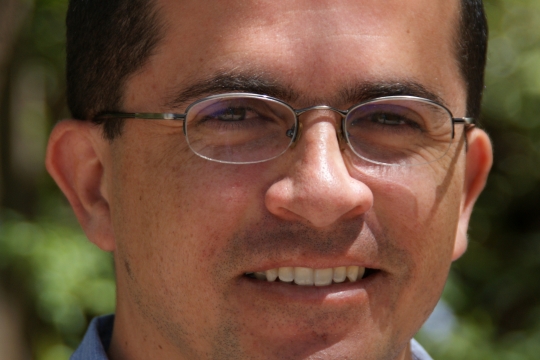Why can some communities succeed in solving collective problems such as provision of drinking water while others fail? Róger Madrigal, EfD Research Fellow, conducted fieldwork in 41 Costa Rican rural villages in order to identify success and failure factors. He made a substantial effort to present the results in an accessible way to people from all the communities as well as to academic peers and high level policy makers.
“The necessity of going back to communities and showing the research results is something I learned from Nobel laureate Elinor Ostrom," says Róger Madrigal (left).
"She always stresses it. And I agree. As a researcher you have an ethical responsibility. You can´t just take information from people in order to write an academic paper. You should also give the results back to the people you interviewed. That´s the only way you can build trust, and it is also important for the impact of your research,” says Madrigal.
Madrigal spent two months with Elinor Ostrom at Indiana University in Fall 2008, before she received the Nobel Prize in Economics (The Sveriges Riksbank Prize in Economic Sciences in Memory of Alfred Nobel 2010). Madrigal notes:
“She gave a lot of support regarding the design of the research project and the methods as well as on how to deal with communities. She always insists on devolving and giving back, which has really influenced my research.”
Hence, Madrigal and his team took the challenge to move from tables and regressions for journals to accessible information translated to Spanish.
Sorted out key messages
“It was difficult. As scholars we are not familiar with communicating our ideas to non experts. Of course we could not use the traditional scholarly approach of PowerPoint presentations and papers. Instead, we sorted out key messages and printed them on small cards that we used at a workshop for all the investigated drinking water community organizations,” says Madrigal.
The preparation of accessible material and practical arrangements required a total of three full weeks of work. A one-day workshop was held on March 6th, 2010 at CATIE in Turrialba, a location suggested by the community representatives. Most communities (2/3) wanted to commit resources to attend the meeting.
“That reflects their interests in the results of the study, and created more pressure and responsibility for our team to deliver something useful for them,” says Madrigal.
"The only way you can build trust"
For each community, Madrigal wrote an individual four-page report about the results. Thus, each community could review the evaluation of their performance in private. The top-three performance communities were awarded a diploma during the workshop, and all participants discussed what makes them successful.
“It was a lot of work. But it’s the only way you can build trust, and it was very rewarding to see how communities use our results,” says Madrigal.
The 41 investigated drinking water community organizations provide water to more than 60 percent of the rural population. On average each of them comprises 200 households. The aim of the research was to understand how geophysical characteristics of watersheds and infrastructure as well as governance and socioeconomic attributes of local users affect three key dimensions of performance in rural communities: financial health, infrastructure condition, and user satisfaction.
The human capital - a key factor
“One important key factor that we found to affect performance is the human capital of the people in charge of water provision, their formal education, experiences, and leadership. This evidence allows us to recommend policy makers to support capacity building,” says Madrigal.
He and his colleagues found that the capacity of local leaders to generate appropriate incentives to involve the community in sustainable solutions for collective-action problems is one of the most important mechanisms that can be linked to high performance.
Working rules and accountability improve performance
Equally important are working rules created by the local communities, and not least that these rules are enforced. Yet another mechanism linked to high performance is local accountability. Downward accountability to the consumers exerts pressure on water committee members to act according to the interests of water users.
“Our research work meant that for the first time these communities were evaluated on their performance. They were eager to see how they were doing compared to other communities, and requested us to come back next year and do some exercises to track changes over time. This reflects the necessity of performance benchmarking standards and yardsticks,” says Madrigal.
He has presented the project as well as its results to top managers of the rural water sector in different meetings and forums since 2008. What remains now is a meeting to present the final results.
Publications
High-quality research, with the potential of being published in high-ranked journals, is of course an equally important objective of the project. In 2010, Madrigal and his research colleagues Francisco Alpízar and Achim Schlüter published an EfD/RFF Discussion Paper based on the results; see “Determinants of Performance of Drinking-Water Community Organizations, A Comparative Analysis of Case Studies in Rural Costa Rica”. Some other papers are forthcoming.
See also a policy brief and an opinion article, published in la Nacion, a Costa Rican newspaper.
By Karin Backteman
